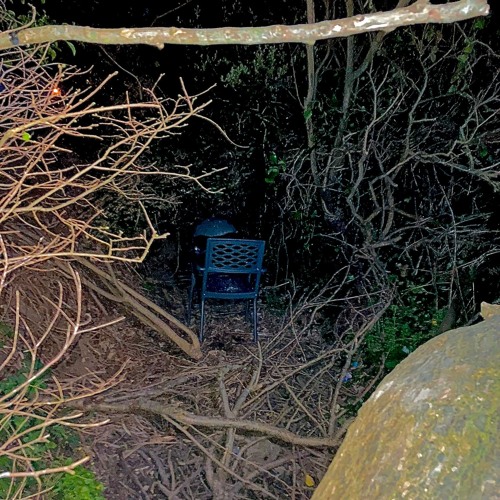Amphigory is a good word; a very particular word. I like that. It refers to a meaningless or nonsensical piece of writing- a rigmarole with apparent meaning which proves empty. A surprising choice for the 18 year old artist from County Meath, Ireland who performs under the name. Surprising indeed as there is no absence of meaning here; though sonically an intensely lo-fi affair – there’s also a clear desire to tap into something utterly devoid of artifice; this is raw and untamed songwriting full of fissures that grip and unsettle but that build an emotive impact of their very own.
What exactly is going on then? It’s certainly a curious thing. There is beauty to be found though, that is certain- that sleepy jingle of those detuned guitars and that languid pace to proceedings both lulls and anaesthetises; but this still makes for an unsettling listen at times. But comfort doesn’t make quality.
Some songs break entirely, others falter and stutter to their haunted conclusions. There are echoes of other so called ‘slowcore’ artists and I would be lying to declare this a work of utterly new sound and direction (what few things could ever warrant such description?). But there is something gripping in these somnambulant dirges that draws you in – as those guitars, treated with spacey, spectral effects, build strange and warbling atmospheres. These songs are worth taking the time to get to know.
There is often a hypnotic and steady rhythm that allows those strummed strings to drift in waves along its surface, as additional sawing solos shape spidery patterns in the air above. Flowerbed opens it all- an eccentric gathering of strangely moving sampled sounds shifting over a swirling and glacial electric guitar pattern that rises and then almost immediately whispers its way to its unexpected caesura, like an unfinished sentence in a broken conversation. Just Stay is probably the most straightforwardly melodious moment on the album but it’s also one of its most affecting. It features some really beautiful but understated guitar work – enriched by subtle, processed keys; it draws you in and allows you to start to make sense of this glorious muddle.
There is a refusal to sweeten and soften the rougher edges- vocals becoming a strange combination of fuzzy reverberation, whispered secret-sharing and massed, spoken abstractions- often unafraid to wail in broken notes that hiss overwhelmingly. There are subtle details though in these seemingly damaged, simple songs – Mango’s use of wonky and shimmering synths, for example, works brilliantly – adding surprising textures to the soporific sentiments. There are moments when this feels slightly too nightmarish, claustrophobic even – and overly soul-wrenchingly open. It begs the question whether these private cries for help are made for public consumption. But this is balanced with juxtapositions of delicate tranquillity too that ensures a desire to return- the pulsating calm of the final song Nothing Left to Do, providing suitably somnific catnip.
These sometimes feel like snapshots of songs- recall in that way the tone experiments of the Levity soundtrack in the tremulous repetitions and brevity at play. Occasionally, the vocals are too distorted to be deciphered and take on an almost Jandek-level dissonance, recalling the very first Smog records (Sewn to the Sky et al) – all deranged, cracked horror and rough-mix feedback. This is the sound of someone pouring their isolated, overflowing emotions onto tape. It isn’t easy but it’s certainly arresting.
Back to Then seems to sample the songwriter’s younger, home-recorded self; it’s odd and solipsistic stuff and adds to the ambience of slight despair. Are these quests for self knowledge- a form of self-lacerating catharsis? There is clearly a desire to be understood here. Perhaps this ghost from the past, this voice of innocence is trying to push further forward Blakean concepts on the dichotomy of existence. Songs of Innocence and of Experience indeed.
I am reminded of the words of Daniel Johnston (as I so often am)…
“To understand and be understood is to be free…”
This feels like Amphigory‘s attempt to find that freedom.
Written by M.A Welsh (Misophone)
